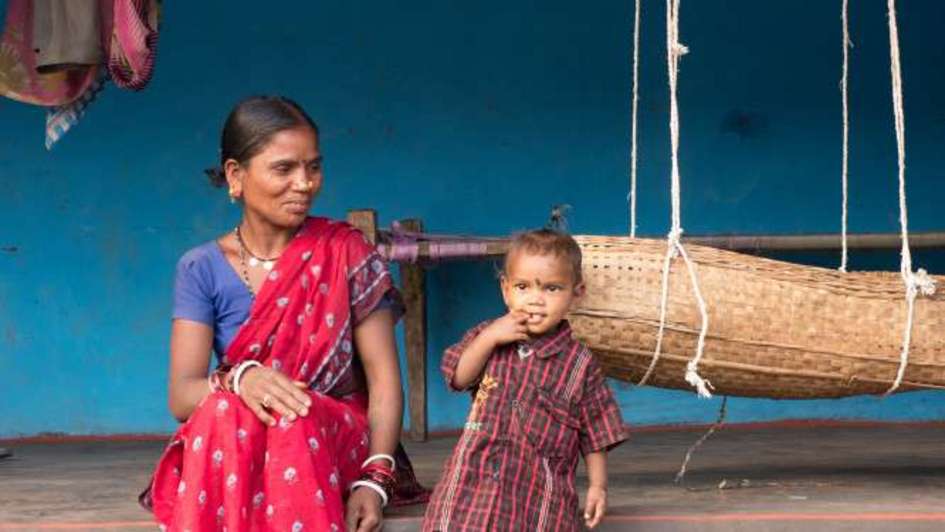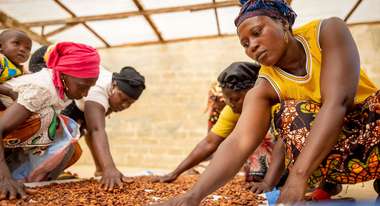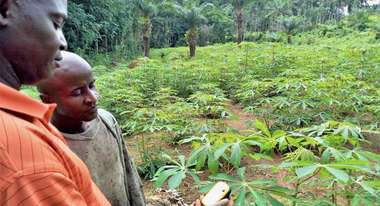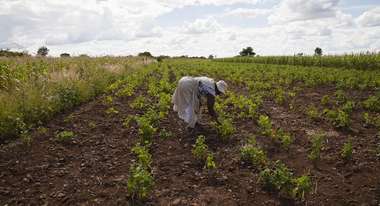Small Holders Want to Operate Well and Sustainable
Three-quarters of the world’s hungry people live in the countryside. It is here that 70 percent of the world’s food is produced in small enterprises.

Every human has a right to food. In Jhiranya in India that idea has long been made a mockery. Here, every family cultivates around 0.2 hectares of land, that is less than one-third the area of a football pitch. The majority plant maize, soya and cotton – the yields are too low to keep hunger at bay. With the support of Welthungerhilfe, smallfarmers are fighting for their rights as humans and citizens of India.
In Kongoussi, a village in Burkina Faso, the biggest problem is the barren soil. It is predominantly women and children who live here, the men have left in search of work. However, with the right cultivation methods, smart irrigation and good tools, together they can secure the nutrition of their children and families.
Jhiranya and Kongoussi – just two villages of the many worldwide, where the people live as smallfarmers. A small cultivation plot and minimal agricultural equipment is typical for smallfarmer enterprises. The majority of these enterprises cultivate their fields for their own needs, carrying out subsistence farming. Only a few can produce a surplus to sell. Correspondingly, the income is very low and, correspondingly, there is a high dependency on local environmental conditions.
Facts and figures
Proportion of hungry people living in rural areas: 75 per cent
Proportion of food produced by smallfarmer enterprises: 70 per cent
Average size of an agricultural farm in Africa and Asia: 1.6 hectares
Average size of an agricultural farm in Germany: 58 hectares
Size of a football pitch according to UEFA guidelines: 0.7 hectares
Different everywhere: locally-adapted agriculture
Economically, ecologically and socially sustainable – small farmers would like to operate in this way. Their aims: Securing nutrition, producing income and preserving natural resources. As such, locally-adapted agriculture is important. What precisely that means varies from region to region. Depending on climate zone, soil quality, water availability, investment opportunities, level of mechanisation, eating habits and market links, it must be decided in each location what will be cultivated and how. In order to be able to live well and long-term from their small farm, the farming families must utilise their entire knowledge and abilities – and learn other things and invest in new cultivation techniques.
What Welthungerhilfe is doing
Welthungerhilfe is therefore, firstly, supporting farming enterprises to cultivate their fields in an ecologically sustainable and yield-secure manner. This works, for example ...
- through diversity in cultivation,
- sustainable irrigation management and
- the improvement of soil fertility through compost and mulch.
Secondly, we are supporting farmers to organise themselves into cooperatives and to store, process and sell their agricultural produce. Equally as important is income from non-agricultural activities, so that at least a portion of the family’s needs is secure in the case of a poor harvest.
What Welthungerhilfe is calling for
But the smallfarmers cannot do it alone! Smallfarmer agriculture needs - and deserves - genuine political and societal support. As such, Welthungerhilfe is calling for smallfarmer agriculture to be placed in the centre of development policy, as a key to food security and fighting poverty – at both national and international level. Unfair, market-distorting and resource-damaging practices and policies should be halted.
Every human has a right to food...
...As such, measures to ensure nutrition security are not an expression of charity. Quite the opposite: The governements of countries suffering hunger in their populations have a duty to support their citizens in the awareness of their rights. We, in industrialised nations, have an obligation to design the political and economic framework conditions so that the human right to food is not violated nor its realisation hindered.







